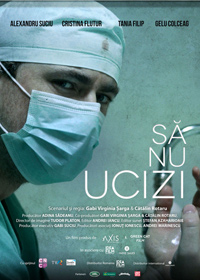Biblical Activism: Romanian Directors on a Crusade Against Corruption
 Gabi Virginia Șarga and Cătălin Rotaru‘s debut feature can be easily seen as part of the ongoing movement protesting corruption in Romania since 2017. Thou Shalt Not Kill makes for a convincing and nuanced portrait of an aspiring pediatric surgeon, Christian, who fights against the corrupt healthcare system in his hospital and – on a wider scale – in the whole country.
Gabi Virginia Șarga and Cătălin Rotaru‘s debut feature can be easily seen as part of the ongoing movement protesting corruption in Romania since 2017. Thou Shalt Not Kill makes for a convincing and nuanced portrait of an aspiring pediatric surgeon, Christian, who fights against the corrupt healthcare system in his hospital and – on a wider scale – in the whole country.
The sudden death of a three year-old boy following a routine hernia operation triggers in Christian a mechanism of active resistance. He is young and promising, the student of a respected professor who runs the hospital. Everything seems fine till he finds out that the disinfection liquids used for cleaning and hand-washing are being diluted with water, thus becoming less effective and leading to the spread of a dangerous bacteria around the hospital. Despite his attempts to investigate the issue, run it up the chain of command to his boss, and seek the support of his own family, Christian is fundamentally alone; the scandal goes all the way up to the Ministry of Healthcare, which is covering up the purchase of the spoilt biocides for multiple clinics across the country. Every step of the way, there is only indifference, fatalism, and sabotage.
The ultimate fight of one passionate human being against the Kafkian system of corruption and injustice is not exactly a new topic for Eastern European and particularly Romanian cinema. Radu Jude won at Karlovy Vary with his two plus hour feature about a theatre director who tries to remind Romanian society of a controversial history in the process of being erased by the officials to make the country look “good.” The “what will people say” refrain also features in Thou Shall not Kill, with Christian’s mother asking him not to stir up trouble by investigating a case that could potentially pit him against his own boss. This is not the only unpleasant layer of Romanian society that Rotaru and Șarga are criticizing. Being involved in the civil movement against corruption themselves, the directors show no mercy on their compatriots, depicting everyone that Christian meets during his crusade as guilty. Some with a bit more humor than others (which makes the film slightly less dark) but the conclusion remains the same, even if a bit on the nose: people are passive, tend to rely on fate rather than facts, and never want to change anything.
While Radu Jude overwhelms viewers with heaps of dialogue on Romanian history and the artist’s civil responsibilities, Rotaru and Șarga go for a slightly more conventional form of “one scene – one cut” storytelling, dutifully following the model to its culmination. This narrative approach is fully justified by the fact that under all the layers of Romanian flaws exposed by the directors lies a huge Biblical subtext – from the title of the film to the name of the main character, up until the climax shot against the backdrop of an apple garden, where his integrity is tempted by evil. The origin of that evil is hence in question, and for Rotaru and Șarga it lies not in a vague “somewhere”, but in a particular “here” that someone is distracting us from.
All this may seem too much for a film about a paediatric surgeon trying to replace the soap in a hospital bathroom. But Rotaru and Șarga manage to craft an intriguing and emotionally involving story that speaks to different people and urges them to question things a tiny bit more than they are used to.
Reviewed on October 20th at the 2018 Warsaw International Film Festival – Competition 1-2. 120 Mins. Part of the The Fipresci Warsaw Critics Project.
★★★/☆☆☆☆☆


